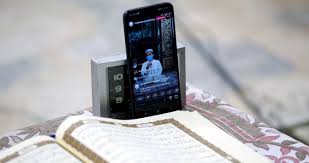Italy: Muslims use technology to celebrate Ramzan

Rome: Technology has come to the rescue of millions of Muslims in Italy during this year’s pandemic-disrupted Ramzan celebrations.
With the country expected on May 4 to begin easing some of the restrictions imposed to stop the spread of COVID-19, worshippers have been taking to social media platforms to join in Friday prayers and moments of reflection to mark the month of fasting.
Online broadcasts have been streamed on Facebook and in messages to Muslim communities throughout Italy, Islamic leaders have referred to Ramadan 2020 as an ideal time to reflect and rediscover family.
Imam Izzedin Elzir, the former president of the Union of Islamic Communities in Italy (UCOII), who lives in Florence, said that for the nearly 3 million Muslims in the country (around 5 percent of the Italian population) this year’s Ramzan festivities were as big as ever.
People had been adapting to the lockdown measures by holding celebrations in their homes, with the call to prayer streamed live on social media.
“The Friday prayer sermon during Ramadan is being streamed on Facebook in order to reach all the faithful in their homes,” Elzir said. “Lessons and moments of collective reflection will also be broadcast online.”
Spokesman for the Islamic Cultural Association, Bouchaib Tanji, said he had requested some regional television channels in Italy to give a few minutes of air time for the call to prayer with a short reading from the Qur’an, and most had accepted, especially in northern regions such as Lombardy and Piedmont, the areas worst-hit by COVID-19.
Similar to Catholic churches and Jewish synagogues, more than 1,000 mosques in Italy will remain closed to worship, even after May 4, the date the government has set to launch the second phase of its response to the COVID-19 crisis by allowing some business and other activities to restart after a two-month national lockdown.
Religious leaders at the Great Mosque in Rome, the largest in Europe with a capacity of 12,000 people, have repeatedly explained to worshippers that community prayers and the breaking of fasting could not be carried out in the customary way under the current circumstances.
In a Facebook message, they told Muslims that they were now called to a further test and greater effort to profess their faith by fasting in isolation at home.
The Islamic Center in Rome has recommended that all Muslims continue to respect and observe the Italian government’s rules aimed at limiting the spread of COVID-19.
Early in March, mosques and other places of Muslim prayer were ordered to close, with only funerals allowed to take place under strict social distancing rules, behind closed doors and attended by just a small number of close family members. Handshakes and greetings with traditional kisses on the check were also banned.
Imams have called on Muslims to turn the unprecedented Ramadan period into “a precious opportunity to rediscover family relationships and reflect.”
In an Italian newspaper interview Yassine Lafram, president of the UCOII in Italy, said: “While this holy month will be spent differently to the ones in past years, relegated to our homes, we must not be discouraged nor lose hope, but keep our faith and the spirit of brotherhood strong at this time.
“The Islamic community calls on Allah to eradicate this ill which is afflicting us and to preserve our country. We renew our condolences to the families of the dead and we hope those who are sick will soon get better.”
And the country’s Islamic community has been showing solidarity with the Italian population during Ramadan.
In Villorba, an industrial town in the Veneto region about 35 km north of Venice, the local Islamic association donated 6,100 euros ($6,620) to the municipality to help toward aid projects for those suffering from the economic consequences of the COVID-19 emergency.
“Although our roots are in other countries, our love for Italy urges us to do everything possible to help the community we belong to now,” the association’s spokesman told Villorba mayor Marco Serena.
The Islamic community in Paganico, a town in Tuscany in central Italy, collected a small sum of money to contribute to a fund to help local families struggling financially during the health crisis.
“It was simply a gesture of gratitude toward a country that welcomed us and still welcomes us every day. Islam teaches us to help people who are in difficulty. During Ramadan we fast, pray and do something for the others,” Youssef En Nabbagui, president of the local Islamic Center, said in a Facebook post.
He also noted the center’s blood donation project and added: “In the next few days people from the Islamic community of Paganico will go to the Misericordia hospital in Grosseto to give blood.”
Civitella Paganico mayor, Alessandra Biondi, told Arab News that she was “very moved by this noble gesture. It makes me feel happy as it is a great way to give back.”
The COVID-19 crisis has caused added problems for the Islamic community in finding burial places for the dead. While waiting for the lockdown restrictions to be lifted, Islamic leaders have for the time being decided to suspend the option to repatriate bodies to their countries of origin.
“We hope that the government and city councils will help us in some way,” said Imam Yahya Pallavicini, president of COREIS, the Islamic Religious Community of Italy.





